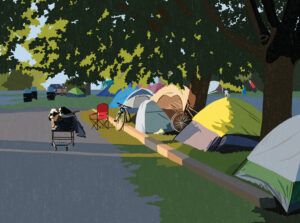
People & Culture
Kahkiihtwaam ee-pee-kiiweehtataahk: Bringing it back home again
The story of how a critically endangered Indigenous language can be saved
- 6310 words
- 26 minutes
People & Culture
Writer James Little reflects on an encounter he had with the beloved folk music icon — and the question he was burning to ask

I was riding my bike through Toronto’s Bridle Path neighbourhood on a cold November morning in 2021 when I first saw him. He was standing on the sidewalk chatting with another man, and I instantly recognized him as Gordon Lightfoot. I knew that he lived somewhere in the area but it was still a thrilling surprise to see him. I was tempted to stop and say hello, but thought I shouldn’t interrupt their conversation. I carried on.
About 15 minutes later, I came back along the same street, and there was Gordon again, this time walking by himself. I thought once more about stopping, but again decided not to bother him, and passed by. As I rode away, I told myself that this would probably be my only chance to talk to one of my musical heroes. I turned my bike and rode back to him.
Like almost any other Canadian, I wanted to tell him how much I enjoyed his music. But I also wanted to ask him about something I’d heard 50 years ago. Back in the early 1970s, one of my brothers had been working for the summer at the Beaumaris Yacht Club in Muskoka — and he’d been told by a local oldtimer that some years earlier, Gordon had flipped a truck on a nearby road while delivering milk. I’d always wondered if that story was true.
As I pulled up to him, I suspected that Gordon wasn’t totally thrilled to see a likely autograph hound — or, even worse, selfie seeker — approaching. So, I decided to cut to the chase. “I have a question. Is it true that you used to drive a milk truck in Muskoka?”
Gordon’s face immediately lit up. “No,” he said with a laugh, “it was a laundry truck!”
And for the next 10 minutes or so, Canada’s unofficial poet laureate regaled me with stories of bombing his laundry truck around the backroads of the Muskoka region when he was a young man. We talked about Rosseau, and Port Carling, and Bala. And we talked about some of the old resorts that no longer exist, such as Windermere’s Fife House. From what I could tell, he had particularly fond memories of a place near Bala called Three Buoys (or maybe Three Boys?—I couldn’t find any reference to it on the Internet). I had the feeling that maybe something of personal significance had happened there. Lightfoot once told the CBC that no place had ever impressed him as much as Muskoka, “the country that I grew up in.”
Eventually I succumbed and switched to music-fan mode. I told him, among other things, that on a rainy day the previous fall, I’d found myself on the mostly-empty main street of his hometown of Orillia with a guitar-strumming busker nearby. I asked the young man to play “If You Could Read My Mind.” It was the best $10 I ever spent.
I could have talked to Gordon for hours and I honestly think he would have liked to do the same, but after 15 or 20 minutes of standing there in the sub-zero chill, I was getting quite cold, and I figured Gordon was too, in his old leather jacket. So I told him I’d better get moving and he said he’d better go home and have breakfast and then start preparing for that evening’s concert, the last of a three-show run to celebrate the reopening of his favourite musical venue, Toronto’s historic Massey Hall.
Afterwards, it occurred to me that I had forgotten to ask Gordon if he had actually flipped that laundry truck on a backroad in his beloved Muskoka. Now I guess I’ll never know. But I’ll bet he did.
Are you passionate about Canadian geography?
You can support Canadian Geographic in 3 ways:

People & Culture
The story of how a critically endangered Indigenous language can be saved

People & Culture
Lightfoot a reçu sa médaille vendredi soir lors d’un concert-bénéfice donné à Toronto

People & Culture
For unhoused residents and those who help them, the pandemic was another wave in a rising tide of challenges

Wildlife
How ‘maas ol, the spirit bear, connects us to the last glacial maximum of the Pacific Northwest